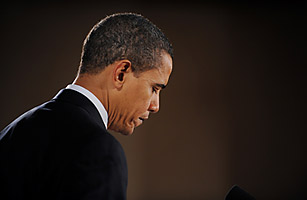
U.S. President Barack Obama
President Barack Obama's European spring break promises to be a giddy carousel of summits, speeches, town hall meetings and parades. But Europeans might well ask, how much Obama is too much?
A glance at the president's schedule reveals just how many times he will meet the same people over the coming days. Seven European Union heads of state or government will attend the G-20 meeting in London. Most E.U. leaders will also be at the NATO summit, which will take place in France's Strasbourg and Germany's Kehl later this week. Then there's the annual E.U.-U.S. summit, scheduled for the Czech capital Prague on April 5. That involves all 27 E.U. leaders and Obama, who will then jet off to Turkey. In between all those dinners and summits, Obama is expected to squeeze in bilateral meetings with European leaders such as French President Nicolas Sarkozy and German Chancellor Angela Merkel. (See pictures of the world reacting to Obama's win.)
While most of these leaders will be meeting him for the first time, an entire week with the same cast of characters might leave Obama wondering if he's experiencing Groundhog Day in Europe.
Of course, the summits will focus on very different issues. The G-20 is about rebuilding a battered world economy. NATO is about celebrating the alliance's 60th birthday and reshaping its Afghan strategy. And the E.U. summit is ... well, that's not too clear. The economic questions will be covered in London, and it's too soon to expect progress on other pressing issues, like climate change. But officials insist that after the E.U.-U.S. tensions of recent years, Obama's arrival cannot be celebrated too fervently. Indeed, earlier this year many Europeans were fretting that Obama wasn't paying enough attention to them.
But Prague could be a summit too far. While nobody doubts the importance of transatlantic relations, a lavish summit with E.U. leaders might exhaust even Obama's wattage. Especially since these meetings traditionally involve only the President of the European Commission and the E.U. Presidency of the day. It was only in 2001, when George W. Bush came to Europe for the first time as President, that all 27 E.U. leaders attended. (See pictures of the Bush-Blair friendship.)
There are political risks too. Bush's first summit with the E.U. in 2001 was characterized by a riot in host city Gothenburg and a collective haranguing by the European leaders over his rejection of the Kyoto climate change treaty. At the Prague summit, Obama will have to smile alongside his unpredictable Czech host, Prime Minister Mirek Topolanek, who last week described the U.S. stimulus plan as the "road to Hell" (Topolanek this weekend revealed that the quip was inspired by the song "Highway to Hell" by Australian heavy metal band AC/DC).
So is all this festival of summits worth it? Overexposure can dull even the brightest stars. Europe itself has had its own eager leaders who soon tire the public, from Britain's over-keen Tony Blair to France's Nicolas Sarkozy, dubbed the "hyperpresident." And in the U.S., voters are wondering if Obama is spreading himself too thin across the media.
But it is better to be seen too much than too little, says Karel Lannoo, Chief Executive Officer at the Brussels-based Centre for European Policy Studies (CEPS) think tank. "Sometimes these meetings can feel like a formality, but Obama does not want to hurt sensitivities by snubbing any potential allies," he says. "He's probably meeting them too much. But in this economic climate, it is always preferable to appear to be doing something."
And if these summits feel like empty gestures, at least there are plans to put more substance into the transatlantic relationship. Last week, the European Parliament called for the creation of a transatlantic political council, jointly chaired by the U.S. secretary of state and the E.U.'s high representative. The pair would meet at least every three months. The European Parliament would also like a transatlantic assembly, a twice annual meeting between European parliamentarians and members of the U.S. Congress. (Vote for the 2009 TIME 100 Finalists.)
And though Obama's summit splurge may give the impression he is overdoing his public relations, it could also be worth the investment in diplomatic terms. He will seek Europe's help over the next few years — on Afghanistan and trade, and the economy and climate change. European leaders want to catch a piece of him on this tour. If the price of yet another meet and greet is a favor down the line, it might be one Obama is willing to pay.